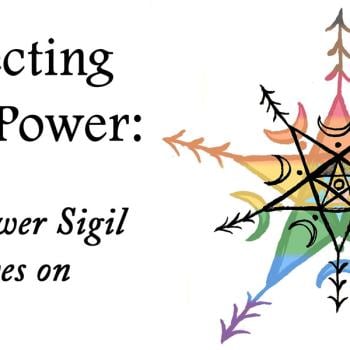Editor's Note: This article is part of the symposium, "What Is Progressive Christianity?" presented by the newly launched Patheos Progressive Christian Portal and in partnership with the Wild Goose Festival (June 23-26). Like us on Facebook to receive today's best commentary on Progressive Christianity.
About five years ago I was talking to a colleague about our church and in a rather off the cuff way described it as progressive. "I don't believe in progress," he harrumphed. Not "I don't believe in Progressivism," or "I don't believe in Progressive Christianity." No. He was quite clear, "I don't believe in progress." Which raises an interesting question for me about the theological idea of progress. Don't get me wrong—I'm not advocating conservatism in the church. I think it's a really bad idea to keep the past in the present in order to control the future. But I wonder what we think we mean when we describe progress in Christianity.
The patron saint of our community, Gregory of Nyssa, was a 4th-century bishop from Cappadocia. When he wasn't administering his diocese and fighting with his critics (how things never change) he took time off to help write the Nicene Creed. In the 8th century he was designated "Father of Fathers" by the Second Ecumenical Council. He was about as orthodox as orthodox gets. And yet some later Christians held him in suspicion because of his writings on the universal salvation of all beings. That sounds like a progressive position, doesn't it?
Like all of the great 4th-century theologians, Gregory was caught up in explaining what the incarnation meant. If you read some of the theology from this period, it's about as stirring as Linux code. But there are times where it absolutely soars, capturing one's theological imagination in a way that best-selling Christian writers just can't. I count Gregory as one whose theology soars.
Like all of the orthodox theologians of his day, Gregory was all about God. He gets to universal salvation not from a position of the inevitable progress of human society, but from the eternal character of God. His position is that God is all in all. Good is the only reality, and evil is non-existence and must inevitably pass away. All beings are essentially good based on the Word of God in creation. And the human soul is the surest icon of God that we have. Thus, the whole ethical system of human life is based in God's character of mercy, love, justice, and reconciliation.
Is that progressive? Maybe. But it sounds ancient to me. More than anything it sounds deeply spiritual, and by "spiritual" I don't mean deeply subjective. Gregory taught that we human creatures pass through three stages of spiritual growth: we begin in ignorance, we move to illumination, and we end in a spiritual darkness where God is present but cannot be comprehended. If there is some way in which we are going to move forward in life, going from "strength to strength" as the Book of Common Prayer says, it can only be on the basis of God's character and God's choice to be known in human life.
So how shall we live? More to the point, how shall we live as those who are drawn to the God of Jesus Christ? We must move forward with the confidence and the humility that characterize Jesus in the gospels. When someone is abused by religious intolerance, we must stoop down and lift that one up with the good news of God's unconditional love. Then we must live that same love in our own lives. We must heal the sick, feed the hungry, raise the dead, pronounce liberation, and remain steadfastly noncompliant with injustice. If we are going to progress in our life in Christ it will only be as we live our lives in imitation of the God of Jesus Christ.
Finally, we cannot remain ignorant of the fact that God's love has been perfected and revealed in Jesus. We must move into that marvelous light where we see clearly that God's Spirit has been poured into our hearts. And finally we must live as those who trust that the God who cannot be comprehended is guiding all human lives toward her presence, not just some human lives.
That's a kind of progress I can believe in.
6/16/2011 4:00:00 AM




